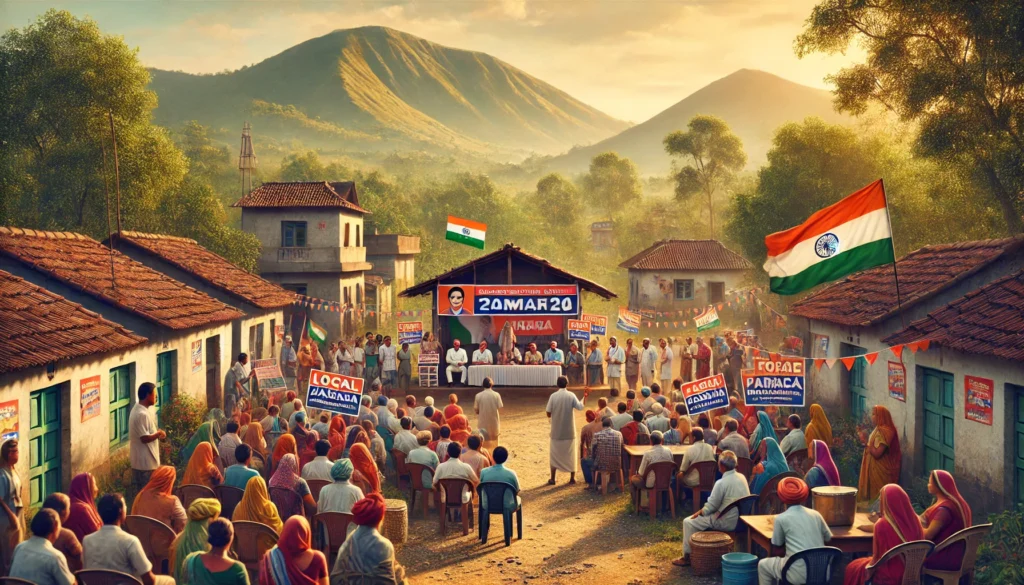
As the political battleground in Maharashtra heats up ahead of the 2024 Assembly elections, several key issues and themes have come into center focus. These elections are crucial for the state as well as the national political landscape since Maharashtra is India’s second most populous state, and thus an important determinant of the national discourse. The electoral battle promises to be a contest of ferocity, with other big contenders like Bharatiya Janata Party, Shiv Sena that is now divided into two factions, Nationalist Congress Party, and Indian National Congress. Let us get a glimpse into the core issues and themes that would dominate the electoral battle.
1. Political Realignments: The Shiv Sena Split
One of the most glaring shifts is the fracture within the Shiv Sena. This party, for a long time, was considered a bastion of regional pride and Hindutva politics. However, after Eknath Shinde’s rebellion in 2022, the party split into two factions: one led by Shinde merged hands with the BJP, while the other led by Uddhav Thackeray went independent and began an alliance with NCP and Congress through Maha Vikas Aghadi (MVA).
Impact on 2024 Elections
This has left voters somewhat confused about who is the “real” Shiv Sena as each faction claims legitimacy. Only time will tell which faction is better able to capture a traditional vote base. Traditionally, this population has been driven by emotive issues such as regional pride and cultural identity. BJPs strategy of supporting the Shinde faction is to garner Hindu votes, but with the Thackeray faction’s alliance with MVA, the constituency in that election would have a rainbow coalition that would attract almost all interest groups.
2. Agriculture and Rural Distress
Agriculturally, the state continues to hold the top rank for suicides in India, and the percentage remains a cause of concern in the drought-prone regions of Vidarbha and Marathwada. The unpredictable seasonal patterns, shifts in market fluctuations, and meager support from the government have made things worse. Two of the new initiatives—the crop insurance scheme known as Pradhan Mantri Fasal Bima Yojana and loan waivers—have also sparked continuous debates on how effective these measures have been.
Key Issues:
- Debt and Loan Waivers: The farmers required the loan waivers must be adequate or at least properly in place. Debt burden of rural sector does not reduce.
- Water Scarcity and Irrigation: There is a drought-like situation prevailing in some places, erratic rainfall conditions, and also poor irrigation infrastructure facilities are prevailing.
- Market Access and MSP: Farmers demand better prices for their harvests and MSP guarantees for their produce, especially in the face of rising input prices like fertilizers and seeds.
3. Urban Development and Infrastructure
The state’s economic centers are other than Mumbai, Pune, and Nagpur. However, frantic urbanization has brought many headaches like infrastructure congestion, traffic jams, polluted air, and poor public amenities.
Major Infrastructure Projects Focus:
- Mumbai Metro and Coastal Road Projects: These projects are aimed to decongest the transport system burdened by the pressures of Mumbai but suffer from delays and controversies over their implementation.
- Affordable Housing: The increasing cost of living in cities has been a matter of concern, particularly with respect to Mumbai, where most residents are struggling to find affordable housing. Although the initiatives of Pradhan Mantri Awas Yojana have finally brought much relief, demand still surpasses supply.
- Smart City Development: Nagpur, Pune, and other cities are pushing the “smart city” agenda with technology-enabled solutions for waste management, public transportation, and e-governance.
The urban voter will also vote based on the parties’ capabilities and track records in delivering their promises of infrastructure projects that speak to their everyday concerns and problems.
4. Caste and Social Justice
Maharashtra has a historical and preceding influence due to its sizeable Dalit and Maratha populations. The quota issue among the Maratha people dominated the 2019 elections and still remains at No. 1 in 2024.
Caste-Based Reservations:
- The Maratha Quota: The Maratha quota issue is still a controversial piece of legislation with almost constant legal-political battles. The BJP government’s decision for quotas provided to Marathas has been faced with all-around criticism at least from the judiciary side as well as the resentment among other backward caste groups.
- Dalit Issues: Though Dalits have always remained marginalized, they are significant voting stock. Parties such as Vanchit Bahujan Aghadi-VBA, which is led by Prakash Ambedkar, have strived at consolidating Dalit votes, and INC and NCP are trying to maintain their stranglehold on these electorate with promises of social justice and economic upliftment.
5. Law and Order, Corruption
This election has mainly centered on the issues of law and order, particularly those of corruption and politics and scandals. For some time now, Maharashtra had witnessed series of high-profile cases of corruption with main politicians being the accused.
Allegations of Corruption:
- Allegations of corruption had been made against top politicians in the NCP and Shiv Sena (Thackeray faction), casting a shadow on the integrity of the political system.
- The allegations themselves and the emphasis by the BJP and its partners on these provide an opening for the party to reach out to the majority voters in cities, who are growing increasingly concerned about issues of governance and accountability.
Whereas opposition parties have charged that central agencies of investigation are used for political retribution by the BJP, which has transformed law and order into a polarizing political campaign theme.
6. Hindutva and Identity Politics
Maharashtra has always been considered the stronghold of Hindutva politics, which is backed by Shiv Sena and BJP. Now, with the Shiv Sena split, both sides are tussling to capture the citadel of Hindutva.
Hindutva vs Secularism:
- With the Shinde-led Shiv Sena and BJP, it is now expected that the Hindutva agenda would be pursued with great vigor—covering issues such as cow protection, religious conversions, and cultural nationalism.
- On the other hand, the MVA alliance led by secular parties such as Congress and NCP will try to cobble together a coalition of minority groups, backward castes, and liberal Hindus who would be preferring this more inclusive form of governance.
7. Economic Growth and Employment
One of the most industrialized states in India, Maharashtra is an important constituent in the national economy. However, of late, it has witnessed stresses in regard to job creation, especially since the COVID-19 pandemic has resulted in widespread unemployment and contraction in economic activities.
Key Issues:
- Youth Unemployment: The biggest challenge to handle while there is a vast population of educated youth is the creation of jobs. Some of the other sectors that demand involvement include IT, manufacturing, and services.
- Industrial Policy: Investment attraction in Maharashtra is generally what the BJP and MVA would be working to do, especially in SEZs and the IT hub cities, Pune and Nagpur.
- MSMEs: SMEs are going to be another major election issue because the pandemic has also affected these sectors considerably.
8. Environmental Issues
They are going to feature as important in the election debate, which comes as a background of severe environmental issues like floods, deforestation, and urban air pollution. Activists have been pushing political parties to address climate change, illegal land development, and water management.
Environment vs Development:
- Megaproject infrastructure, including the coastal road project, has been panned along environmental lines: mangrove destruction and displacement, on one hand, and a lack of preparedness for climate change, on the other.
- Sustainable development, green jobs, and renewable energy adoption are leading topics of discussion as the electorate—the cities, especially—look for long-term answers.
Conclusion: The Road Ahead for Maharashtra
The Maharashtra Assembly election is going to be a high-stakes contest where regional issues and national politics will intermingle. Political realignments driven by the Shiv Sena split, rural distress caused by farmers’ suicides, caste dynamics, and economic concerns are going to be part of this narrative. The outcome of this election will define not only the future of Maharashtra but also will have national implications and forthcoming assembly elections in Hindi belt states.
Balancing regional aspirations against effective governance and the everyday concerns of voters—about agriculture, employment, or the infrastructure—will remain the key for any party seeking a majority.

Kalyan Chandra
Kalyan chandra is a political strategist, media and communication consultant with the expertise in public relations, marketing, political research, election campaign management, psephology and digital analytics. He focuses on strategic political consulting, offering services that include competitive research, public opinion collection, and digital media management. Kalyan has significantly contributed to successful campaigns across India with his meticulous approach and deep understanding of the political landscape.
